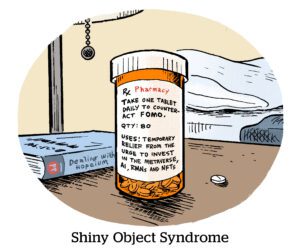Covering retail media entails a great deal of déjà vu.
For instance, The Trade Desk announced today an integration with the CVS ad tech business, called the CVS Media Exchange (CMX). It will beta test a self-serve DSP for targeting and attributing programmatic campaigns using the pharmacy chain’s first-party data and loyalty program.
In a briefing last week, TTD VP of data partnerships Ben Sylvan recounted a story about retail media audiences. Being nosy (his words), he looked up the price of his neighbor’s new motorcycle. And he ended up in an Oracle retail data segment (RIP) called “Need for Speed” – despite the fact he’d never ride a motorcycle. This demonstrated the futility of buying demographic and intent-based audience segments based on web browsing, he said.
Except, he caught himself halfway through: “I may have given you this example before.”
He had. I couldn’t remember exactly when either, though. It may have been when The Trade Desk partnered with Macy’s for self-serve DSP extensions or Albertsons for the same.
The new CVS business, called CMX, also gave déjà vu flashbacks to the one-time Walmart Exchange, the antediluvian version of Walmart Connect, which went by WMX.
Incrementality measurement
Incrementality is a retail media term for attribution. It’s the attempt to measure the actual contribution of advertising to a business’s bottom line.
But in a market where everything old is new and everything new has been done a thousand times, it’s important to focus on other kinds of incremental gains.
For instance, The Trade Desk’s big win as the only DSP partner with programmatic access to CVS customer data (at least for now) is still just a relatively small win in terms of real dollars. It’s a beta test involving a few brands that are strategic partners for the pharmacy and The Trade Desk, said Parbinder Dhariwal, CVS VP and GM of CMX.
On the other hand, small wins during a beta test or retail media bake-off can turn into serious business. Just look at Walmart, which was a flagship AppNexus client before The Trade Desk won a shot at a test budget in 2020. The rest is history.
Someday, CVS might open its data to more targeting, potentially even as targeting for non-endemic brands – a resort brand targeting people who buy travel-size sunscreen, say. The CVS CMX business is a young shoot. Perhaps seeing “CVS CMX” a few thousand times will inspire a name change.
But once the business bears fruit, The Trade Desk wants to be there.
 More incremental wins
More incremental wins
Retail media has had other incremental gains, too, even since Sylvan first recounted to me the parable of ending up in Oracle’s “Need for Speed” consumer segment in the past year or two.
In 2022, for instance, The Trade Desk transitioned from selling retail data as a CPM to charging a percent of media fee. A quiet but pivotal change that unlocked value for advertisers and retailers, Sylvan said.
Previously, many web advertisers were priced out of retail media. The data is so expensive on a CPM rate that it could cost more than the media itself for display inventory. Advertisers don’t like spending less than half of the budget on actual ads. But that’s what happens if you combine cheap media CPMs and pricey data CPMs.
On the flip side, retailers felt they were hosed selling on a CPM for expensive CTV placements.
Charging a percent of media means the value of the data matches the value of the inventory, Sylvan said. Retailers are fairly compensated and advertisers don’t get painful sticker shock on the price.
Retailers are also now more amenable to sharing their data and being compared side by side.
Allowing advertisers access via The Trade Desk “gives them a better purview of what’s actually happening across their media buys and pits us up against their broader spend levels,” Dhariwal said.
That retailers like CVS, Macy’s and Albertsons allow third-party DSPs to compare campaigns across other retailers and the open web is major progress, even though it can seem like the same press release is copy-and-pasted year after year. When Walmart signed its pioneering self-serve DSP partnership with The Trade Desk three years ago, the retailer took a walled garden approach. And advertisers still don’t see user IDs for Walmart Connect campaigns on the platform.
Perhaps retailers in general will end up as walled garden platforms, like Walmart and Amazon. CVS and other large chains are still testing, after all.
“There’s a real first here,” Dhariwal said. “When we think about transparency, whether it’s transparency about measurement or transparency around pricing, giving our suppliers that level of activation and control is incredibly important.”












